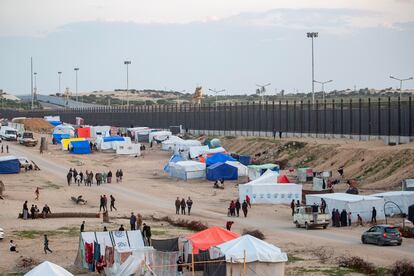Top UN court rejects South African request for urgent measures to safeguard Rafah
The International Court of Justice said that because of the ‘perilous situation’ in Rafah, Israel must respect earlier measures imposed last month at a preliminary stage in a landmark genocide case

The top UN court on Friday rejected a South African request to impose urgent measures to safeguard Rafah in the Gaza Strip, but also stressed that Israel must respect earlier measures imposed late last month at a preliminary stage in a landmark genocide case.
The International Court of Justice said in a statement that the “perilous situation” in Rafah “demands immediate and effective implementation of the provisional measures indicated by the Court in its Order of 26 January 2024, which are applicable throughout the Gaza Strip, including in Rafah, and does not demand the indication of additional provisional measures.”
The world court added that Israel “remains bound to fully comply with its obligations under the Genocide Convention and with the said Order, including by ensuring the safety and security of the Palestinians in the Gaza Strip.”
The statement cited U.N. Secretary-General Antonio Guterres, saying that the court noted “the most recent developments in the Gaza Strip, and in Rafah in particular, ‘would exponentially increase what is already a humanitarian nightmare with untold regional consequences’, as stated by the United Nations Secretary-General.”
Israel has identified Rafah as the last remaining Hamas stronghold in Gaza and vowed to continue its offensive there. An estimated 1.4 million Palestinians, more than half of Gaza’s population, has crammed into the city, most of them displaced people who fled fighting elsewhere in Gaza.
Israel has said it will evacuate the civilians before attacking, though international aid officials have said there is nowhere to go due to the vast devastation left behind by the offensive.
South Africa announced Tuesday that it had lodged an " urgent request " with the International Court of Justice to consider whether Israel’s military operations targeting the southern Gaza city of Rafah breach provisional orders the court handed down last month in a case alleging genocide.
South African foreign ministry spokesman Clayson Monyela said in a message on X, formerly Twitter, that the court “has affirmed our view that the perilous situation demands immediate & effective implementation of the provisional measures indicated by the Court in its Order of 26 January 2024 which are applicable throughout the #GazaStrip & has clarified that this includes #Rafah.”
The court’s statement was issued on the Jewish sabbath, when government offices are closed, and there was no immediate comment from the Israeli Foreign Ministry.
On Thursday, Israel urged the world court to reject what it called South Africa’s “highly peculiar and improper” request.
Israel strongly denies committing genocide in Gaza and says it does all it can to spare civilians and is only targeting Hamas militants. It says Hamas’ tactic of embedding in civilian areas makes it difficult to avoid civilian casualties.
Even so, the court last month ordered Israel to do all it can to prevent death, destruction and any acts of genocide in Gaza, but panel stopped short of ordering an end to the military offensive that has laid waste to the Palestinian enclave.
The ruling was at a preliminary stage of a case brought by South Africa accusing Israel of breaching the Genocide Convention.
The court also called on Hamas to release the hostages who are still in captivity. Hamas urged the international community to make Israel carry out the court’s orders.
South Africa’s legal campaign is rooted in issues central to its identity: Its governing party, the African National Congress, has long compared Israel’s policies in Gaza and the West Bank to its own history under the apartheid regime of white minority rule, which restricted most Blacks to “homelands.” Apartheid ended in 1994.
Sign up for our weekly newsletter to get more English-language news coverage from EL PAÍS USA Edition
Tu suscripción se está usando en otro dispositivo
¿Quieres añadir otro usuario a tu suscripción?
Si continúas leyendo en este dispositivo, no se podrá leer en el otro.
FlechaTu suscripción se está usando en otro dispositivo y solo puedes acceder a EL PAÍS desde un dispositivo a la vez.
Si quieres compartir tu cuenta, cambia tu suscripción a la modalidad Premium, así podrás añadir otro usuario. Cada uno accederá con su propia cuenta de email, lo que os permitirá personalizar vuestra experiencia en EL PAÍS.
¿Tienes una suscripción de empresa? Accede aquí para contratar más cuentas.
En el caso de no saber quién está usando tu cuenta, te recomendamos cambiar tu contraseña aquí.
Si decides continuar compartiendo tu cuenta, este mensaje se mostrará en tu dispositivo y en el de la otra persona que está usando tu cuenta de forma indefinida, afectando a tu experiencia de lectura. Puedes consultar aquí los términos y condiciones de la suscripción digital.








































